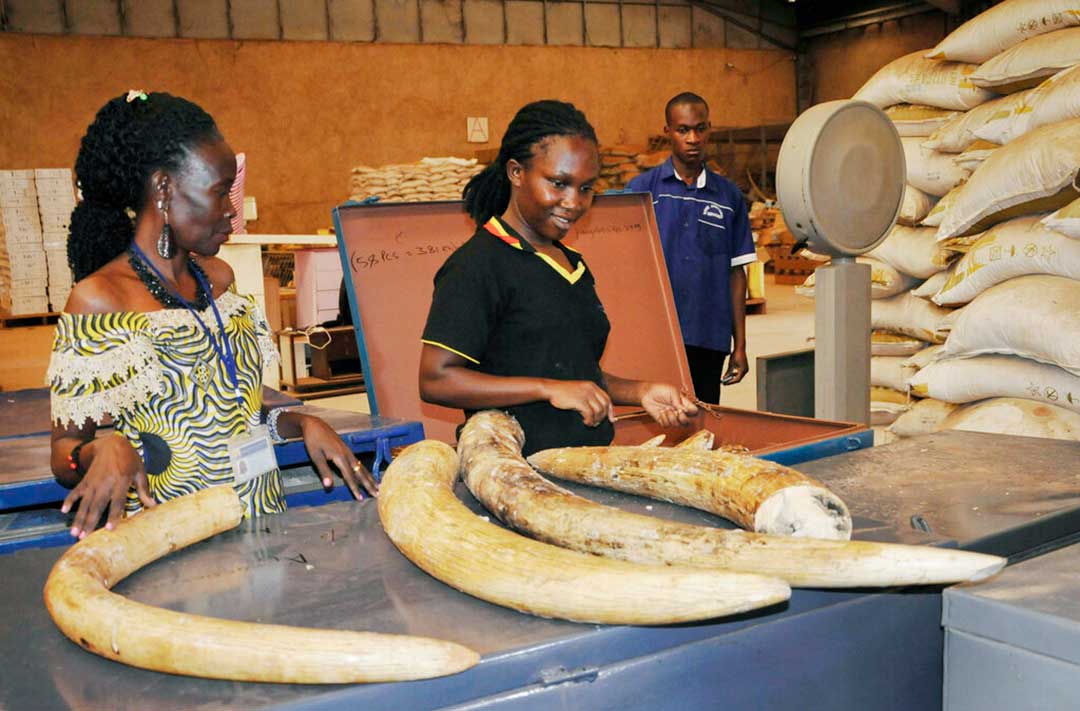Uganda’s Pioneering Wildlife Court Is Deterring Crime
ADF STAFF
Gladys Kamasanyu frequently travels about an hour outside of Uganda’s capital, Kampala, to the Entebbe Zoo, where she feeds, pets and even talks to rhinos, elephants, pangolins and other endangered animals.
She also talks to the staff at the zoo, known as the Uganda Wildlife Conservation Education Center, to get updates on smuggling, trafficking and poaching. These crimes often are linked to international crime syndicates and high demand associated with traditional Chinese medicine (TCM).
As the chief magistrate of Uganda’s Standard Utilities and Wildlife Court, the first of its kind in Africa, Kamasanyu considers herself a voice for the voiceless.
“An animal who is a victim in a wildlife case does not have a chance to report that wrongful act,” she told Deutsche Welle. “They don’t have a chance to follow up on their case. They don’t have a chance to appear in court to tell their story, to show us their pain.”
Since Uganda’s pioneering wildlife court was established in 2017 in Kampala, Kamasanyu has convicted more than 600 traffickers while presiding over more than half of the court’s 2,000 proceedings.
The court was created to fast-track wildlife cases and sees about six to eight cases a day.
“There was a problem in the different courts in the way they were sentencing these offenders,” Senior Magistrate Stella Maris Amabilis told NTV Uganda. “So, you find that many times the offenders would not get a sentence that would be equivalent to the offense that had been committed.”
About 11% of Uganda’s territory has been designated as legally protected conservation areas. Harming or killing animals on those lands is punishable by laws that were strengthened in 2019.
Between 2021 and 2022, there were nearly 3,000 documented cases.

Kamasanyu said she is determined to help curb the illegal wildlife trade because most poaching, smuggling and trafficking cases are not noticed, reported, investigated, prosecuted or punished.
“I realized how much depletion is going on, the losses that are out there,” she said. “I keep waking up and I get to know there’s a big role as a judicial official that I really have to play to save nature, not for me today, but all those who will come after me.”
In 2022, Kamasanyu sentenced ivory trader Pascal Ochiba to life in prison for repeated offenses. He went to prison in 2017 after he was arrested with four pieces of ivory and the skin of an Okapi, a rare, zebra-like forest animal found only in the neighboring Democratic Republic of the Congo.
Uganda Wildlife Authority UWA Executive Director Sam Mwandha was pleased to see the maximum sentence handed out.
“This is a landmark achievement in our war on illegal wildlife trade in Uganda,” he said in a statement. “We must do our best in our times to protect our wildlife, otherwise history will judge us harshly.”
Cases like Ochiba’s have brought much-needed attention to the problem, said UWA Deputy Director of Field Operations Charles Tumwesigye, who noted that about 80% of wildlife cases in Uganda have been successfully prosecuted since the wildlife court was created.
“We started to see prosecution being taken seriously, because now this is a special court,” he told DW. “We’re bringing suspects from all over the country, and we started to get deterring sentences.
“People know that once you commit this crime, you will be taken to Kampala where there is a special court and you can be given a harsh punishment. To me that was a very good thing.”
TCM is a “significant cause” for the decline of African species of elephants, tigers, leopards, pangolins and rhinos, according to the Environmental Investigation Agency, a nonprofit dedicated to wildlife protection. Poachers often work for Chinese-led organized crime groups that smuggle and traffic materials to extensive Asian markets.
“Some people believe they are medicine,” Tumwesigye told NTV.
Kamasanyu sees deterrence of wildlife crime as her part to play on behalf of voiceless animals.
She especially enjoys educating children when they visit the Entebbe Zoo and founded a nonprofit organization called Help African Animals to raise awareness for conservation and the protection of endangered species.
“The little ones can be groomed to be the future conservationists,” she said. “If we didn’t catch them young, they can as well become the future poachers.”


Comments are closed.